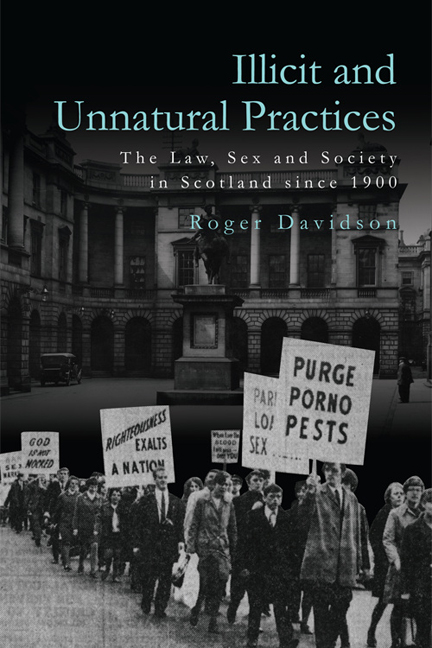Book contents
- Frontmatter
- Contents
- List of Figures and Tables
- Acknowledgements
- List of Abbreviations
- 1 Introduction
- 2 ‘Venereal Trouble’: The Case of ‘Professor’ Abraham Eastburn
- 3 ‘This Pernicious Delusion’: Law, Medicine and Child Sexual Abuse
- 4 ‘Unnatural Carnal Connection’: Bestiality and the Law in Early Twentieth-century Scotland
- 5 ‘There’s the Man who Shifts the Babies’: Abortion in the Scottish High Court, 1900−30
- 6 ‘An Open and Notorious House of Lewdness’: Dora Noyce and the Danube Street Brothel
- 7 Cure or Confinement? Law, Medicine and the Treatment of Homosexual Offenders in Scotland, 1950−80
- 8 ‘Liable or Likely to Deprave and Corrupt the Morals of the Lieges’: Sex Shops and Moral Panic in Late Twentiethcentury Scotland
- 9 ‘Culpable and Reckless Conduct’: Criminalising the Transmission of HIV in Scotland, 1983−2014
- 10 Conclusion
- Sources and Select Bibliography
- Index
5 - ‘There’s the Man who Shifts the Babies’: Abortion in the Scottish High Court, 1900−30
Published online by Cambridge University Press: 23 April 2021
- Frontmatter
- Contents
- List of Figures and Tables
- Acknowledgements
- List of Abbreviations
- 1 Introduction
- 2 ‘Venereal Trouble’: The Case of ‘Professor’ Abraham Eastburn
- 3 ‘This Pernicious Delusion’: Law, Medicine and Child Sexual Abuse
- 4 ‘Unnatural Carnal Connection’: Bestiality and the Law in Early Twentieth-century Scotland
- 5 ‘There’s the Man who Shifts the Babies’: Abortion in the Scottish High Court, 1900−30
- 6 ‘An Open and Notorious House of Lewdness’: Dora Noyce and the Danube Street Brothel
- 7 Cure or Confinement? Law, Medicine and the Treatment of Homosexual Offenders in Scotland, 1950−80
- 8 ‘Liable or Likely to Deprave and Corrupt the Morals of the Lieges’: Sex Shops and Moral Panic in Late Twentiethcentury Scotland
- 9 ‘Culpable and Reckless Conduct’: Criminalising the Transmission of HIV in Scotland, 1983−2014
- 10 Conclusion
- Sources and Select Bibliography
- Index
Summary
INTRODUCTION
In contrast to other countries in the United Kingdom, Europe and North America, little is known about the abortion practices and prosecutions in early twentieth-century Scotland. Where the Scottish legal history sur-rounding the crime of procuring abortion has been explored, it has primarily been as a cursory preamble to a discussion of the 1967 Abortion Act and the implications for its subsequent interpretation of disparities between Scottish common law and English statute law. This detailed analysis of High Court cases seeks for the first time to reveal the process of abortion and its interface with the law in Scotland over the period 1900−30.
In drawing conclusions from these court proceedings, the social historian is subject to a range of limitations. First, it is uncertain how far the abortion narrative captured in the High Court records was representative of the many illegal abortions that were neither reported nor prosecuted, and that according to contemporary commentators resulted in the termination of as many as one in eight of all pregnancies and accounted for a similar proportion of maternal mortality. Secondly, the gender bias of the legal process has to be recognised. As Usborne has observed, women's testimonies in abortion cases were ‘often shaped by the specific questions asked by male interrogators who followed a set pattern of enquiry’ and by the recasting of their answers in legal and medical language. As a result, their experiences and perspectives could often be subordinated to the more limited (quintessentially male) agendas of policing and prosecution. Thirdly, the absence of trial transcripts limits the degree to which the competing legal, medical and popular narratives within courtroom proceedings can be examined. In addition, as with other offences, without access to the judge's closing remarks, it is difficult to capture the views of the judiciary on illegal abortion and the social ideology that informed them. Such constraints are compounded by the scarcity of substantive newspaper reports of High Court abortion cases. Apart from a very few trials where a prominent member of the community, such as a leading medical practitioner, was involved or an exhumation required, court proceedings were rarely reported in any detail.
- Type
- Chapter
- Information
- Illicit and Unnatural PracticesThe Law, Sex and Society in Scotland since 1900, pp. 74 - 113Publisher: Edinburgh University PressPrint publication year: 2018



